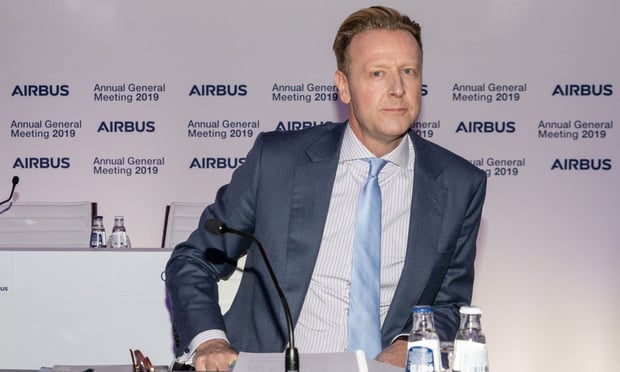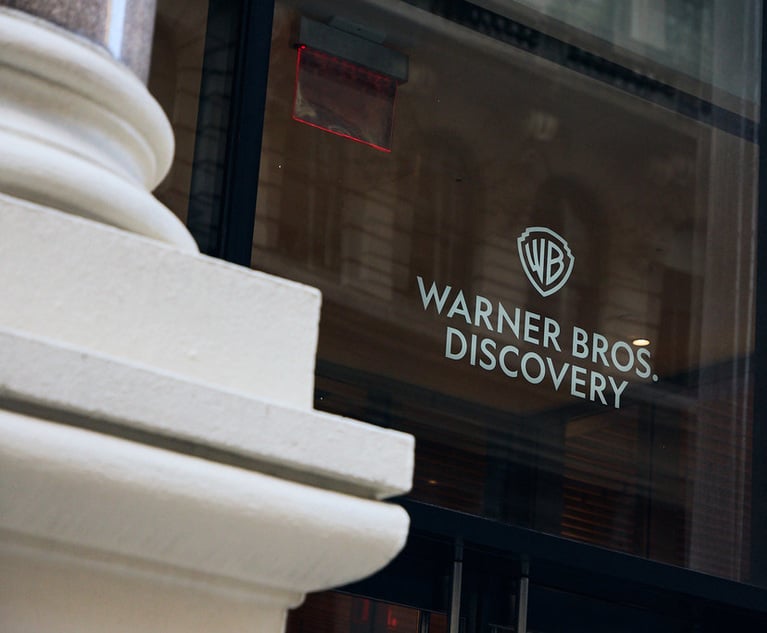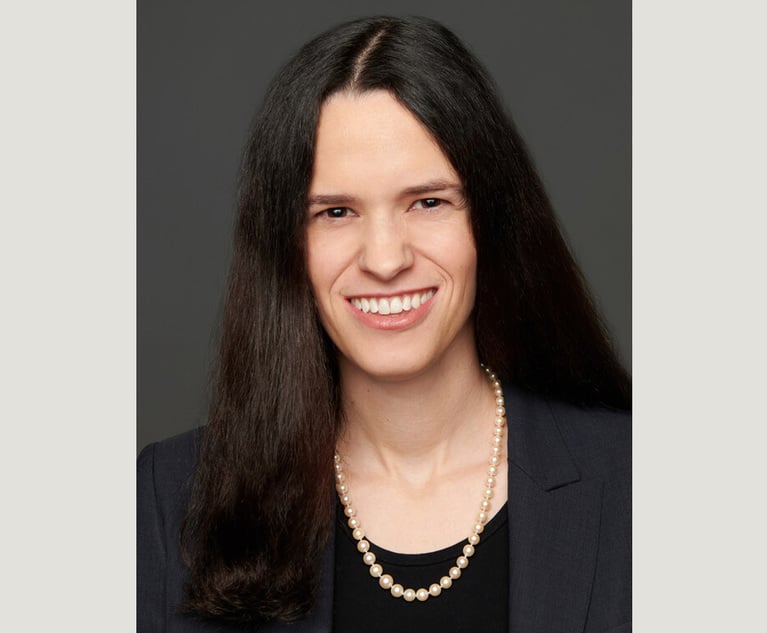Airbus Compliance Execs Misled General Counsel Who Questioned Bribery Risks
When Airbus' new general counsel John Harrison identified some potential risk issues in 2015, senior export compliance managers stonewalled.
February 05, 2020 at 05:10 PM
4 minute read
 Airbus' general counsel John Harrison.
Airbus' general counsel John Harrison.
Several members of the compliance team at Airbus SE in France were complicit in the foreign bribery scheme that resulted in the record-high $3.9 billion global settlement last week, according to court documents.
For instance, when Airbus' new general counsel John Harrison identified some potential risk issues in 2015, senior export compliance managers stonewalled.
"Senior export control officers appeared reluctant to change the company's existing compliance process," says a criminal information attached to the Airbus deferred prosecution agreement. "Specifically, a senior export compliance executive wrote to the general counsel that adequate processes and procedures were in place" and followed, when, in fact, they were not.
"The compliance executive's false statements were reviewed by senior export compliance management prior to being made," the document says, adding these managers also knew the statements were false.
The same compliance managers routinely certified that no political contributions, fees or commissions had been paid as part of the sale and export of defense articles, when, in fact, they never inquired into payments to third-party business partners who were channeling bribes and never viewed the business partner contracts.
The 49-page document is a litany of how not to run a compliance department. It states that Airbus agreed to bring in new legal and compliance leadership and to remove about a dozen executives. None of the executives was named. The company is cooperating with further investigations into individuals.
Neither Harrison nor the company responded to messages this week after the company reached the global settlement with the prosecutors in the U.S., France and the U.K. A company statement confirming the settlement last week said Airbus declined to further comment.
The U.S. Department of Justice claimed between 2008 and 2015 Airbus used third-party business partners to bribe government officials as well as nongovernment airline executives in China and around the world, resulting in "the largest global foreign bribery resolution to date."
 Matthew Boyden of Houston law firm R. McConnell Group
Matthew Boyden of Houston law firm R. McConnell GroupMatthew Boyden, a former federal prosecutor with over 20 years of investigative experience as a U.S. postal inspector investigating global criminal enterprises, told Corporate Counsel the large penalty "was a combination of a few factors—the size and scale of the corruption scheme coupled with the national security component [of] falsely reporting licensing information to export military technology."
Boyden, who was not involved in the case, recently joined the boutique Houston law firm R. McConnell Group. He said the government wanted "the deterrence impact of a 10-digit settlement. … Companies understand dollars."
The U.S. set aside $1.8 billion of its penalty, with most of the remaining money going to France and the U.K. The company will still owe the U.S. about $600 million.
Airbus hired Harrison in 2015 to handle the situation and negotiate the global settlement, as he had done as general counsel at Paris-based Technip SA in 2010.
He oversaw the complex Airbus negotiations involving five law firms in three countries, and signed the settlement documents along with outside counsel Robert Luskin of Paul Hastings.
Harrison previously worked at Clifford Chance, in its London, New York and Paris offices. At Airbus he took a newly created executive committee position that consolidated the responsibilities of the general counsel and the chief ethics and compliance officer. He replaced former general counsel Peter Kleinschmidt, a 25-year Airbus veteran.
What could Airbus have done differently? Boyden, the former prosecutor, pointed to the third-party business partners.
"Case after case we see third parties playing a significant role, either actively used by the company to commit crimes or where companies look the other way when third parties get things done," he said.
Minimizing the risk requires not only screening third parties, but following up and auditing them, Boyden added. "Everyone can look good on the first date," he said.
Changing the culture also helps. "The easiest way to stay out of trouble is to have a mindset where you really want to identify risk and address it in a proactive way," Boyden explained. "If you're a company and [have a] compliance program that does something because you have to, as opposed to trying to really get to the bottom of issues, ultimately the program won't be effective."
This content has been archived. It is available through our partners, LexisNexis® and Bloomberg Law.
To view this content, please continue to their sites.
Not a Lexis Subscriber?
Subscribe Now
Not a Bloomberg Law Subscriber?
Subscribe Now
NOT FOR REPRINT
© 2025 ALM Global, LLC, All Rights Reserved. Request academic re-use from www.copyright.com. All other uses, submit a request to [email protected]. For more information visit Asset & Logo Licensing.
You Might Like
View All

JetBlue Airways Will Pay $2M to Settle DOT Charges of Chronically Delayed Flights

In-House Moves of the Month: Boeing Loses Another Lawyer, HubSpot Legal Chief Out After 2 Years
5 minute readLaw Firms Mentioned
Trending Stories
- 1Uber Files RICO Suit Against Plaintiff-Side Firms Alleging Fraudulent Injury Claims
- 2The Law Firm Disrupted: Scrutinizing the Elephant More Than the Mouse
- 3Inherent Diminished Value Damages Unavailable to 3rd-Party Claimants, Court Says
- 4Pa. Defense Firm Sued by Client Over Ex-Eagles Player's $43.5M Med Mal Win
- 5Losses Mount at Morris Manning, but Departing Ex-Chair Stays Bullish About His Old Firm's Future
Who Got The Work
J. Brugh Lower of Gibbons has entered an appearance for industrial equipment supplier Devco Corporation in a pending trademark infringement lawsuit. The suit, accusing the defendant of selling knock-off Graco products, was filed Dec. 18 in New Jersey District Court by Rivkin Radler on behalf of Graco Inc. and Graco Minnesota. The case, assigned to U.S. District Judge Zahid N. Quraishi, is 3:24-cv-11294, Graco Inc. et al v. Devco Corporation.
Who Got The Work
Rebecca Maller-Stein and Kent A. Yalowitz of Arnold & Porter Kaye Scholer have entered their appearances for Hanaco Venture Capital and its executives, Lior Prosor and David Frankel, in a pending securities lawsuit. The action, filed on Dec. 24 in New York Southern District Court by Zell, Aron & Co. on behalf of Goldeneye Advisors, accuses the defendants of negligently and fraudulently managing the plaintiff's $1 million investment. The case, assigned to U.S. District Judge Vernon S. Broderick, is 1:24-cv-09918, Goldeneye Advisors, LLC v. Hanaco Venture Capital, Ltd. et al.
Who Got The Work
Attorneys from A&O Shearman has stepped in as defense counsel for Toronto-Dominion Bank and other defendants in a pending securities class action. The suit, filed Dec. 11 in New York Southern District Court by Bleichmar Fonti & Auld, accuses the defendants of concealing the bank's 'pervasive' deficiencies in regards to its compliance with the Bank Secrecy Act and the quality of its anti-money laundering controls. The case, assigned to U.S. District Judge Arun Subramanian, is 1:24-cv-09445, Gonzalez v. The Toronto-Dominion Bank et al.
Who Got The Work
Crown Castle International, a Pennsylvania company providing shared communications infrastructure, has turned to Luke D. Wolf of Gordon Rees Scully Mansukhani to fend off a pending breach-of-contract lawsuit. The court action, filed Nov. 25 in Michigan Eastern District Court by Hooper Hathaway PC on behalf of The Town Residences LLC, accuses Crown Castle of failing to transfer approximately $30,000 in utility payments from T-Mobile in breach of a roof-top lease and assignment agreement. The case, assigned to U.S. District Judge Susan K. Declercq, is 2:24-cv-13131, The Town Residences LLC v. T-Mobile US, Inc. et al.
Who Got The Work
Wilfred P. Coronato and Daniel M. Schwartz of McCarter & English have stepped in as defense counsel to Electrolux Home Products Inc. in a pending product liability lawsuit. The court action, filed Nov. 26 in New York Eastern District Court by Poulos Lopiccolo PC and Nagel Rice LLP on behalf of David Stern, alleges that the defendant's refrigerators’ drawers and shelving repeatedly break and fall apart within months after purchase. The case, assigned to U.S. District Judge Joan M. Azrack, is 2:24-cv-08204, Stern v. Electrolux Home Products, Inc.
Featured Firms
Law Offices of Gary Martin Hays & Associates, P.C.
(470) 294-1674
Law Offices of Mark E. Salomone
(857) 444-6468
Smith & Hassler
(713) 739-1250







